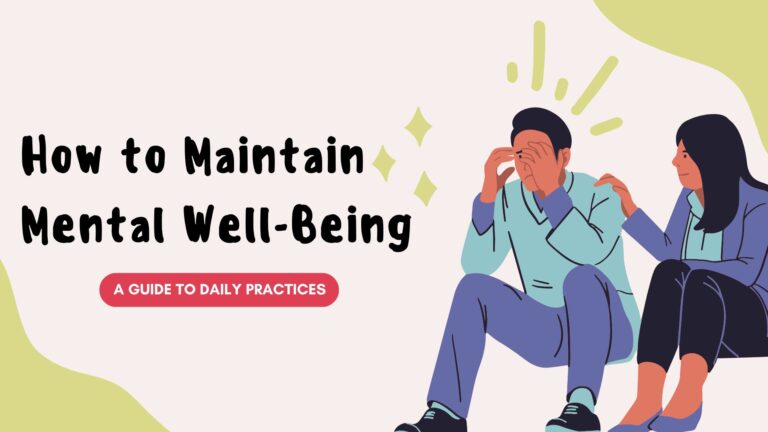Maintaining mental well-being is essential for leading a fulfilling and balanced life. Just like physical health, mental health requires consistent care and attention. Incorporating daily practices into your routine can help cultivate a positive mindset and enhance your overall mental well-being. Here’s a comprehensive guide on how to maintain mental well-being through simple, effective practices.

1. Start Your Day with Mindfulness
What Is Mindfulness?
Mindfulness involves being fully present in the moment, allowing you to engage with your thoughts and feelings without judgment. It can help reduce stress and improve emotional regulation.
How to Practice Mindfulness Daily
- Morning Meditation: Spend a few minutes each morning meditating. Focus on your breath and allow your thoughts to come and go without clinging to them.
- Mindful Eating: During meals, savor each bite. Pay attention to the flavors and textures of your food, promoting a sense of gratitude for nourishment.
- Gratitude Journaling: Write down three things you’re grateful for each day. This practice helps shift your focus toward the positive aspects of life.
2. Stay Physically Active
The Link Between Physical Activity and Mental Health
Regular physical activity can boost your mood, reduce anxiety, and improve overall mental clarity. Exercise releases endorphins, which are natural mood lifters.
How to Incorporate Exercise Into Your Routine
- Find Activities You Enjoy: Whether it’s dancing, hiking, cycling, or yoga, choose activities that make you feel good.
- Set Realistic Goals: Aim for at least 30 minutes of moderate exercise most days. Start small and gradually increase your activity level.
- Join a Class or Group: Participating in group activities can provide social support and make exercise more enjoyable.

3. Nurture Your Relationships
The Importance of Social Connections
Healthy relationships are crucial for mental well-being. They provide emotional support, reduce feelings of isolation, and enhance happiness.
How to Cultivate Positive Relationships
- Schedule Regular Catch-Ups: Make time for friends and family, whether it’s a weekly call or monthly get-together.
- Be Present: When spending time with loved ones, practice active listening and engage fully in conversations.
- Offer Support: Be there for others when they need it, fostering a sense of reciprocity and connection.
4. Establish Healthy Routines
The Role of Routines in Mental Well-Being
Having a daily routine can create structure and stability, helping to reduce stress and anxiety. Routines also foster a sense of accomplishment.
Tips for Creating a Balanced Routine
- Set Consistent Sleep Schedules: Aim for 7-9 hours of sleep each night and go to bed and wake up at the same time daily.
- Plan Your Day: Create a daily to-do list that includes both work and personal tasks. Prioritize tasks based on importance.
- Incorporate Breaks: Schedule short breaks throughout your day to recharge. Step away from your desk, stretch, or take a quick walk.
5. Engage in Creative Activities
The Benefits of Creativity for Mental Health
Engaging in creative activities can be a great outlet for self-expression and stress relief. It allows you to explore emotions and fosters a sense of accomplishment.
Ways to Embrace Creativity
- Try New Hobbies: Explore painting, writing, crafting, or playing a musical instrument to find what resonates with you.
- Join a Class or Workshop: Participate in local classes or online workshops to learn new skills and meet like-minded individuals.
- Schedule Creative Time: Set aside time each week to focus on creative activities, making it a priority in your routine.

6. Limit Screen Time and Social Media
The Impact of Technology on Mental Well-Being
Excessive screen time and social media use can lead to increased anxiety and feelings of inadequacy. It’s essential to find a healthy balance.
Tips for Managing Screen Time
- Set Boundaries: Limit social media usage to specific times during the day, and consider using apps that track and restrict screen time.
- Engage in Offline Activities: Dedicate time to activities that don’t involve screens, such as reading, hiking, or cooking.
- Practice Digital Detoxes: Take breaks from technology, especially during weekends or vacations, to recharge your mental batteries.
7. Seek Professional Help When Needed
Recognizing the Importance of Support
Sometimes, self-care practices may not be enough to manage mental health concerns. Seeking professional help is a proactive step toward better mental well-being.
When to Reach Out for Help
- Persistent Feelings of Sadness or Anxiety: If feelings of sadness or anxiety interfere with daily life, consider speaking with a mental health professional.
- Difficulty Coping with Life Changes: If you’re struggling to cope with significant life changes, such as loss or job changes, don’t hesitate to seek support.
- Thoughts of Self-Harm: If you experience thoughts of self-harm or suicide, it’s crucial to seek immediate help from a professional or a crisis hotline.
Conclusion
Maintaining mental well-being requires consistent effort and a commitment to self-care. By incorporating practices such as mindfulness, physical activity, nurturing relationships, establishing healthy routines, embracing creativity, managing screen time, and seeking professional help when needed, you can cultivate a balanced mind and enhance your overall quality of life. Remember, mental well-being is a journey, and every small step you take contributes to your overall health and happiness.
FAQs
Why is physical activity important for mental health?
Physical activity boosts mood, reduces anxiety, and improves mental clarity by releasing endorphins, which are natural mood lifters.
How can I nurture my relationships for better mental well-being?
Schedule regular catch-ups, practice active listening, and offer support to strengthen connections with friends and family.
What should I include in a healthy daily routine?
Include consistent sleep schedules, planned daily tasks, and scheduled breaks to create structure and stability in your life.
When should I seek professional help for my mental health?
Consider seeking professional help if you experience persistent feelings of sadness or anxiety, have difficulty coping with life changes, or have thoughts of self-harm.


